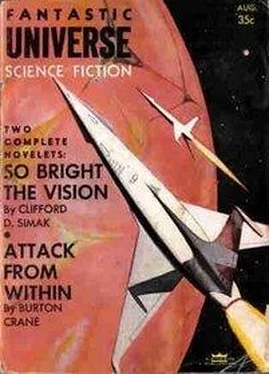“This machine is the noblest instrument I have ever played,” he said.
I looked at the graph he had drawn up for the piece, in his painstaking crabbed handwriting. The ultrasonics were literally incredible. In just a few weeks he had mastered subtleties I had spent fifteen years learning. He had discovered that skillfully chosen ultrasonics, beyond the range of human hearing but not beyond perception, could expand the horizons of music to a point the presynthesizer composers, limited by their crude instruments and faulty knowledge of sonics, would have found inconceivable.
The Chopin almost made me cry. It wasn’t so much the actual notes Chopin had written, which I had heard so often, as it was the unheard notes the synthesizer was striking, up in the ultrasonic range. The old man had chosen his ultrasonics with the skill of a craftsman—no, with the hand of a genius. I saw Kolfmann in the middle of the room, standing proudly while the piano rang out in a glorious tapestry of sound.
I felt that this was my greatest artistic triumph. My Beethoven symphonies and all my other interpretations were of no value beside this one achievement of putting the synthesizer in the hands of Kolfmann.
He handed me another tape and I put it on. It was the Bach Toccata and Fugue in D Minor ; evidently he had worked first on the pieces most familiar to him. The sound of a super-organ roared forth from the synthesizer. We were buffeted by the violence of the music. And Kolfmann stood there while the Bach piece raged on. I looked at him and tried to relate him to the seedy old man who had tried to wreck the synthesizer not long ago, and I couldn’t.
As the Bach drew to its close I thought of the Macauley circuit again, and of the whole beehive of blank-faced handsome technicians striving to perfect the synthesizer by eliminating the one imperfect element—man. And I woke up.
My first decision was to suppress the Macauley circuit until after Kolfmann’s death, which couldn’t be too far off. I made this decision out of sheer kindness; you have to recognize that as my motive. Kolfmann, after all these years, was having a moment of supreme triumph, and if I let him know that no matter what he was doing with the synthesizer the new circuit could do it better, it would ruin everything. He would not survive the blow.
He fed the third tape in himself. It was the Mozart Requiem Mass , and I was astonished by the way he had mastered the difficult technique of synthesizing voices. Still, with the Macauley circuit, the machine could handle all these details by itself.
As Mozart’s sublime music swelled and rose, I took out the diagram Macauley had given me, and stared at it grimly. I decided to pigeonhole it until the old man died. Then I would reveal it to the world and, having been made useless myself (for interpreters like me would be a credit a hundred) I would sink into peaceful obscurity, with at least the assurance that Kolfmann had died happy.
That was sheer kindheartedness, gentlemen. Nothing malicious or reactionary about it. I didn’t intend to stop the progress of cybernetics, at least not at that point.
No, I didn’t decide to do that until I got a better look at what Macauley had done. Maybe be didn’t even realize it himself, but I used to be pretty shrewd about such things. Mentally, I added a wire or two here, altered a contact there, and suddenly the whole thing hit me.
A synthesizer hooked up with a Macauley circuit not only didn’t need a human being to provide an esthetic guide to its interpretation of music, which is all Macauley claimed. Up to now, the synthesizer could imitate the pitch of any sound in or out of nature, but we had to control the volume, the timbre, all the things which make up interpretation of music. Macauley had fixed it so that the synthesizer could handle this, too. But also, I now saw that it could create its own music, from scratch, with no human help. Not only the conductor but the composer would be unnecessary. The synthesizer would be able to function independently of any human being. And art is a function of human beings.
That was when I ripped up Macauley’s diagram and heaved the paperweight into the gizzard of my beloved synthesizer, cutting off the Mozart in the middle of a high C. Kolfmann turned around in horror, but I was the one who was really horrified.
I know. Macauley has redrawn his diagram and I haven’t stopped the wheels of science. I feel pretty futile about it all. But before you label me reactionary and stick me away, consider this:
Art is a function of intelligent beings. Once you create a machine capable of composing original music, capable of an artistic act, you’ve created an intelligent being. And one that’s a lot stronger and smarter than we are. We’ve synthesized our successor.
Gentlemen, we are all obsolete.












